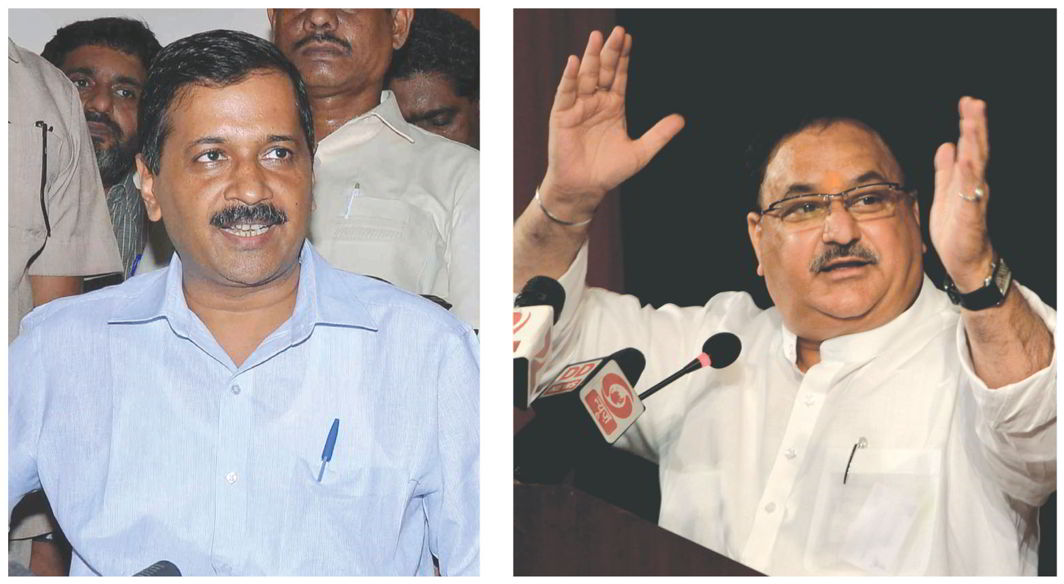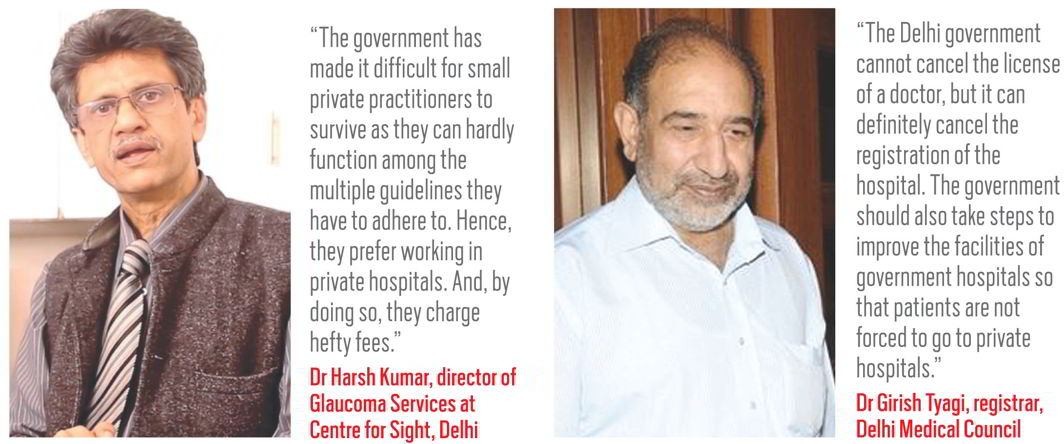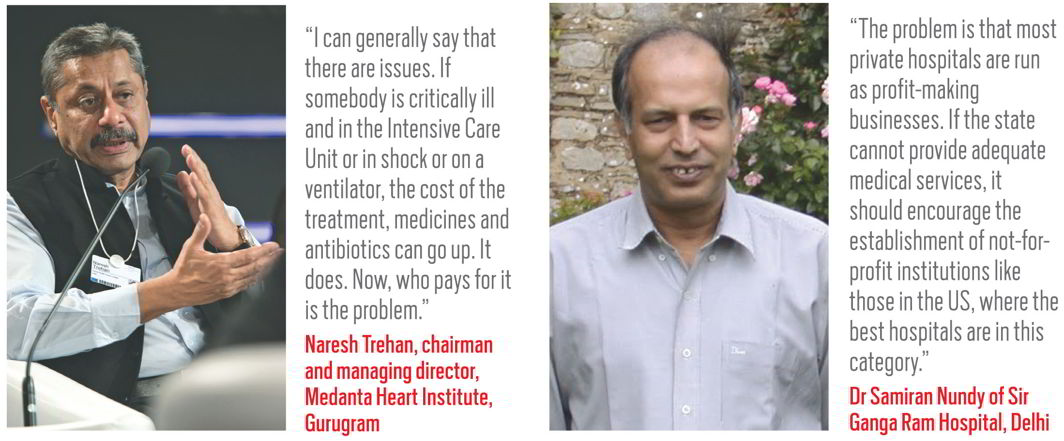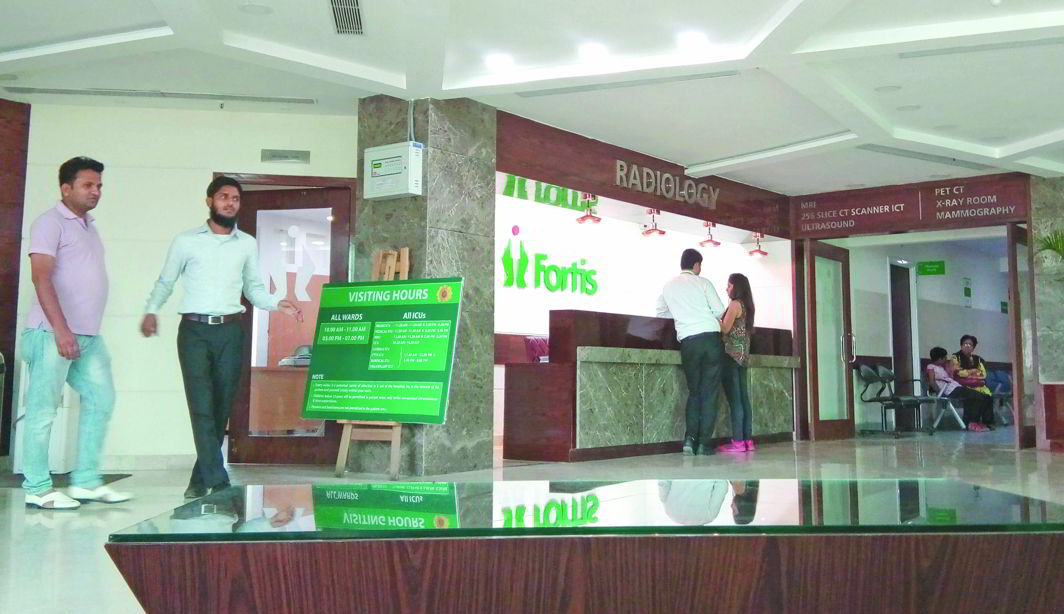Above: Max Super Speciality Hospital, Shalimar Bagh
Two recent cases have shown the problems plaguing the health sector. While governments indulge in populist measures and private hospitals become profit-oriented, it is the patients who suffer
~By Usha Rani Das and Lilly Paul
On the morning of November 30, two premature babies were born to Ashish and Varsha at Max Super Speciality Hospital, Shalimar Bagh, a residential colony in North Delhi. While the girl was stillborn, her twin brother was declared dead shortly after. Shockingly, the bodies were handed over to the grieving parents in plastic bags. Six hours later, to the utter shock of the parents, the boy was found alive while being taken for the last rites. He was rushed to another private hospital and kept in an incubator, where he breathed his last after six days. After the family protested, the doctors were summarily terminated and the license of the hospital was cancelled on December 8 by the Delhi government.
The shock to the healthcare system in India was reinforced as another private hospital in Delhi was embroiled in controversy, this time for overcharging the parents of a girl who died of dengue. Seven-year-old Adya was referred to Fortis Memorial Research Institute, Gurugram, on August 31. After a 15-day struggle, she died of Dengue Shock Treatment. Worse, her family was handed a whopping bill of Rs 15,79,322 by the hospital. Her father, Jayant Singh, had alleged overcharging and medical negligence. Details of the medical items billed by the hospital were shocking—750 pairs of gloves and 600 syringes were charged for Adya’s 15-day stay. In his complaint to the police, Singh alleged that the doctor treating Adya had switched off the ventilator and ambu bag when she was taken in a private ambulance. To make matters worse, the management, he said, refused to provide an ambulance if she was taken to another hospital.
While Union Health Minister JP Nadda said he had asked for a detailed report to be sent to the health ministry and an expert committee formed by the Haryana government stated in its report that the hospital was responsible for “negligence”, it is obvious that medical malpractice is a serious issue. The real problem is when it becomes entangled with politicians chasing populist causes and a hostile public.
MAX HOSPITAL CASE
In the case of Max Hospital, while the Delhi government cancelled its license on three grounds under the Delhi Nursing Homes Registration Act (DNHRA), 1953, it does not have the authority to do so. One of the grounds was the hospital violating the condition for providing free treatment to the poor. Free land was granted to Max provided it gave free treatment to 10 percent of its inpatients and 25 percent outpatients. An inspection carried out on November 20, 2017 showed that the Economically Weaker Section Cell was non-functioning and had a few broken chairs lying around. Records also showed that barely eight percent of patients had been provided free treatment. Secondly, in accordance with a May 12, 2017 order, the government had permitted the hospital to increase its bed strength by 10-20 percent due to the increase of dengue, chikungunya and fever cases. But it found that the beds were being used for non-fever cases. A showcause notice was issued on November 22 but the reply by the hospital authorities was found un-satisfactory. Third, following the twins’ death, the Delhi government held the hospital guilty of criminal negligence.

Dr Girish Tyagi, registrar, Delhi Medical Council, told India Legal: “The Delhi government cannot cancel the license of a doctor, but it can cancel the registration.” But K Sujatha Rao, former Union health secretary, said the government has no such powers. She told India Legal: “It is bad in law…they have no power. This makes the action arbitrary and high-handed, amounting to abuse of power. Technically, on the second ground, it can have the power (sanctioning of bed strength is covered by the DNHRA), but then, for 25 beds being used for other cases when there is no evidence of a dengue or chikungunya case being denied admission, is an overreach. This action is not just bad in law but totally irresponsible.”
WHAT THE ACT SAYS
If one goes by the Act, the state government does not have the authority to cancel the registration. The Act only covers registration of hospitals and looks into maintenance of patient records and adherence to certain standards in infrastructure and human resources. It does not cover matters of medical negligence. Though under Section 7 of DNHRA, the supervising authority may at any time cancel the registration of a person in respect of a nursing home on any ground, Section 8 states that before cancelling the license, one month’s notice should be issued stating the appropriate reasons.
Rao added: “I don’t believe in closing down hospitals and if such a power must be vested with the government, then the conditions that deserve such a closure should be listed. These could include illegal organ transplantation, not taking infection control procedures, etc. There must be a public health dimension, not an individual act of injury or death.” Meanwhile, Max Healthcare has filed an appeal with Lt-Governor Anil Baijal against cancellation of the registration of Max Hospital, Shalimar Bagh.
Experts see the Delhi government’s move as a populist measure. Advocate Ashok Agrawal told India Legal: “The grounds on which the license was cancelled are not valid. It was not in public interest. It was just to make people happy. Cancelling the registration on grounds that are not valid is too harsh. These are populist measures.” He added that the action would fall.
PATIENTS’ PLIGHT
The chaos affected patients the most. According to a statement by Max Healthcare, Max Hospital, Shalimar Bagh, treated on a monthly basis around 14,000 patients in the OPD, attended to over 1,600 emergency patients and an additional 3,000 patents in inpatient wards. It stated: “In compliance of the cancellation order, not only did we have to turn down the OPD and new IPD, but planned procedures such as 171 chemotherapies, 63 surgeries and 241 dialysis sessions had to be cancelled, rescheduled or transferred.”
 Doctors, meanwhile, are trying to draw attention to the medical diagnosis of the incident. Dr Vijay Singh Chauhan, chairman and managing director, Prakash Hospital, Noida, told India Legal: “One has to understand that we are talking of fetuses. They were only 22-weeks old. They were not going to survive under any circumstance as they were premature. The chances of survival in such cases is hardly two percent. Even after putting them on a ventilator, they are prone to life-threatening risks, mental and physical deformities and blindness.” Also, as the parents had accepted DNR (do not resuscitate), he said doctors were not at fault. DNR is a legal order wherein cardiopulmonary resuscitation or advanced cardiac life support is withheld and natural death is allowed.
Doctors, meanwhile, are trying to draw attention to the medical diagnosis of the incident. Dr Vijay Singh Chauhan, chairman and managing director, Prakash Hospital, Noida, told India Legal: “One has to understand that we are talking of fetuses. They were only 22-weeks old. They were not going to survive under any circumstance as they were premature. The chances of survival in such cases is hardly two percent. Even after putting them on a ventilator, they are prone to life-threatening risks, mental and physical deformities and blindness.” Also, as the parents had accepted DNR (do not resuscitate), he said doctors were not at fault. DNR is a legal order wherein cardiopulmonary resuscitation or advanced cardiac life support is withheld and natural death is allowed.
According to a WHO report on preterm birth, in the US, an estimated 15 million premature babies are born every year and almost one million children die each year due to complications of preterm birth. Globally, prematurity is the leading cause of death in children under the age of five years, it states.
COMMERCIALISED HEALTHCARE
Despite that, the recent cases have brought attention to the increase in medical negligence cases over the past few years. It is estimated that over five lakh patients die annually because of this. A 2016 study by Supreme Court advocate Mahendra Kumar Bajpai, who specialises in medical law, showed a 110 percent rise in the number of medical negligence cases in India every year. The study also reveals that 90 percent of all such cases involve hospitals; it was 50 percent 20 years ago. Also, 12 percent of all cases decided by consumer courts are to do with medical negligence. Between 60 to 66 per cent of the filed cases are because hospitals take improper consent from relatives before performing certain procedures or switching hospitals, or improper documentation throughout the course of diagnosis and treatment. In another study done by AIIMS’ forensic department, it was found that wrong treatment was the most common cause for people to complain about medical negligence.
In the case of Fortis, an expert committee set up by Haryana to probe the child’s death and headed by Principal Secretary, Health, Amit Jha, said: “After going through the statements of doctors and father, it appears prima facie that the parents were guided by the doctor opinion to take the child home. The patient was neither brain dead nor in a vegetative state, but was alive as per statement of (treating doctor)… The LAMA (leave against medical advice) in this case is shrouded in ambiguity. Under these circumstances, it appears that prima facie, under the garb of LAMA process, the hospital disposes of the patients in an unethical manner when attendants no longer want to continue the treatment.” It added: “So by taking off oxygen and other life supporting treatment, the doctors have not kept the patient on the same treatment line. This is lapse/negligence/unethical conduct also… Hence the case is recommended to be sent to Medical Council of India for action… under this, all senior doctors treating case… should be held accountable.”
However, the committee did not find any anomaly in allegations of overcharging by the hospital. Paediatric specialists stated in the report: “There are no guidelines on how many consumables are to be used for a PICU patient. However, general guidelines state that a liberal use of consumables—for example syringes, gloves, etc—must be made to decrease risk of hospital-acquired infections.” But it was observed that the girl was issued Meropenem injection 1 gm of two different brands with different MRPs with a huge gap in pricing. “Though MRPs of the above mentioned drugs are not notified by NPPA, but due to a huge gap between the MRPs of two brands of the same drugs, the basis of selection of the particular drug to be used is neither understandable nor a satisfactory explanation has been given in this regard by authorised signatory of the firm. However, the drug prescribed by the treating doctor is supplied to the patient,” the report states.
EXPENSIVE HEALTHCARE
In a similar case in March 2017, the National Pharmaceutical Pricing Authority (NPPA) fixed the price of stents and made it mandatory for stent-makers and hospitals to display the new prices on their websites after a PIL was filed by advocate Birender Sangwan. He filed the PIL after Metro Hospital in Faridabad had charged over Rs 1.25 lakh for a stent that was actually priced at Rs 23,000.
Dr Samiran Nundy of Sir Ganga Ram Hospital, Delhi, told India Legal: “The problem is that most private hospitals are run as profit-making businesses. If the state cannot provide adequate medical services, it should encourage the establishment of not-for-profit institutions like those in the US where the best hospitals are in this category.”
Medical negligence often leads to tragic consequences. In April 2017, more than 20 people were injected with a contaminated medicine in their eyes at the Guru Teg Bahadur Hospital. This affected their vision and put them at a risk of losing their eyesight completely. In another horrific incident in June 2017, the Delhi State Consumer Redressal Commission fined a private hospital Rs 30 lakh for callously leaving a needle inside a woman’s uterus after a surgery. In March 2017, the National Consumer Disputes Redressal Commission ordered Apollo Hospital in Hyderabad and one of its doctors to pay Rs 4 lakh as compensation for failing to take the consent of a patient and her family before a high-risk surgery that allegedly deteriorated her health, resulting in her death.
In February 2017, Apollo Gleneagles Hospital in Kolkata decided to return the entire treatment cost of Rs 7.23 lakh to the family of Sanjay Roy who died shortly after being shifted from the hospital. The family had to allegedly keep their fixed deposit certificates as security to get him discharged as they had no money. The political chaos that followed forced the hospital management to take this decision. Similar cases of private hospitals extorting huge amounts of money from patients led to the Mamata Banerjee government introducing the West Bengal Clinical Establishments (Registration, Regulation and Transparency) Bill, 2017.

One of the most important cases that set a precedent in the history of medical negligence in India was the Balram Prasad vs Kunal Saha & Ors case. In this case, Dr Kunal Saha fought for almost 20 years against three doctors of AMRI Hospital, Kolkata for causing his wife’s death and won the case. The highest compensation ever paid in such cases was announced—Rs 11.41 crore.
The medical sector in India is riddled with such examples. In The Indian Express, Sujatha Rao wrote: “In such a laissez faire environment that would embarrass Adam Smith or Kenneth Arrow, the hospitals have been permitted to put profit above life. When chasing a return on investment without regard to impact on life—be it in the area of health or environment—is considered legitimate, then it implies unleashing animal spirits that later become difficult to contain. That is the situation today and what we are witnessing is the tension between ‘compromised governments’ and a profit-chasing private sector that is able to get by, with impunity.”
MALPRACTICE VS MISDIAGNOSIS
While recent rulings have encouraged people to go to courts against medical negligence, the line between human error and malpractice has become thinner. Nundy said: “There is a difference between medical negligence in which the treatment has deviated from the acceptable standards and a complication where the management has been correct but the outcome unexpectedly poor.”
In this context, the decision by the Delhi government in Max’s case will affect the healthcare sector adversely. Nundy said: “Doctors will now start practicing ‘defensive’ medicine which will increase the cost of healthcare as they will do more tests, increase the number of referrals to other physicians and use expensive medicines.”
Dr Harsh Kumar, director of Glaucoma Services at Centre for Sight, Delhi, told India Legal that doctors at Max Hospital were at fault, but for the “erring of one person, you cannot shut down an entire hospital”. He said people would hesitate to come into the medical profession now. Given that there is already a severe shortage of doctors in the country, the outcome will be disastrous. He said: “Doctors are the soft targets. The government has made it difficult for small private practitioners to survive as they can hardly function among the multiple guidelines they have to adhere to. Hence, they prefer working in private hospitals. And, by doing so, they charge hefty fees.”
All these naturally make the gap between the doctor-patient wider.
But from tragedy comes hope. In a welcome move, the Delhi government has set up a nine-member expert committee to recommend norms to be followed by private hospitals—including capping the margin of profit from sale of medicines and consumables as well as diagnostic investigations. The panel will be headed by Dr Kirti Bhushan, Director General of Health Services. State Health Minister Satyendra Jain said the committee will “prepare a mechanism” to prescribe drugs mentioned in the National List of Medicines.
ENFORCE LAWS
Meanwhile, Nadda has directed all states to implement the Clinical Establishment Act, 2010 as soon as possible. At present, only 16 states have incorporated this Act. Under it, it is mandatory for hospitals to provide all information related to patients and their treatment—procedures and the cost of treatment at every stage of illness—and to appoint an ombudsman for redressal of complaints.
But the lack of proper laws will make any remedial measure a failure. Dr Naresh Trehan, chairman and managing director, Medanta Heart Institute, Gurugram, told India Legal: “I can generally say that there are issues. If somebody is critically ill and in the ICU or in shock or on the ventilator, the cost of the treatment, medicines and antibiotics can go up. It does. Now, who pays for it is the problem.”
Rao said the government should regulate hospital charges. “A range of charges can be considered but based on a consultative process. This would require having uniformly accepted standards and protocols. Hospitals charging more must have a justification for doing so.
“Having said that, it is possible that an ICU in a 5-star hospital could cost Rs 1 lakh a day if you take into account their ownership pattern, cost of capital, dividends that they have to declare, the personnel and cost of inputs (land/ equipment/personnel deployed/consumable/ tests etc) and profit,” Rao added.
Tyagi said that the government should also take steps to improve the facilities of government hospitals so that patients are not forced to go to private hospitals for treatment.
Is this a case of physician heal thyself? The big hospital chains in India certainly need to show more concern for patients and less for the bottomline but there is also the classic market connect of supply and demand. Barring the All India Medical Institute in Delhi, which deals with patients who are political VIPs, government hospitals lack sophisticated and advanced medical equipment and diagnostic tools. This is mainly because of the expense involved in importing them. Naturally, the family of a critically ill patient will rush to a private hospital, regardless of the costs involved. It’s a Catch-22 situation and till private hospitals become more transparent, as Dr Trehan suggests, and politicians stop pandering to populism, it is the patients who will continue to be trapped in the middle.


